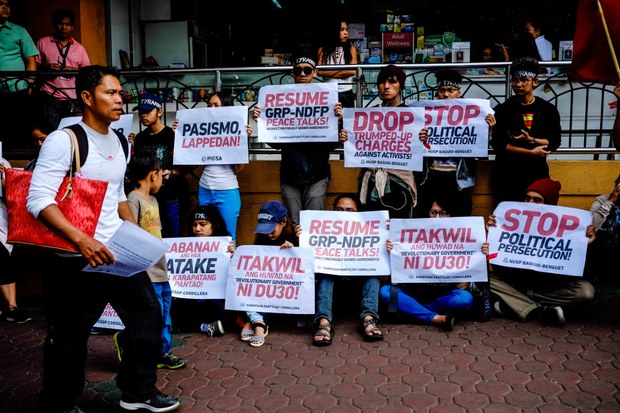Philippine Communist Rebels Ousted from Southern Bases, Military Says
2017.12.11
Cagayan de Oro and Cotabato, Philippines
 Leftist students join a protest to mark Human Rights Day in the northern Philippine city of Baguio, with demonstrators calling for the government, among other things, to resume peace talks with the National Democratic Front of the Philippines, the political wing of the Communist Party of the Philippines, Dec. 10, 2017.
Leftist students join a protest to mark Human Rights Day in the northern Philippine city of Baguio, with demonstrators calling for the government, among other things, to resume peace talks with the National Democratic Front of the Philippines, the political wing of the Communist Party of the Philippines, Dec. 10, 2017.
The Philippine military said Monday it had dislodged communist New People’s Army guerrillas from four of their camps in the southern Philippines last week, but bomb attacks by the NPA wounded seven soldiers and a police officer at the weekend.
The captured camps included the NPA’s regional headquarters in San Agustin, a remote village in the town of Surigao del Sur, part of the country’s southern third.
“The regional camp was a plum prize for us. It was the rebel nerve center for their military operation in the region,” said Col. Andres Centeno, chief of the Army’s regional Infantry Brigade.
Soldiers seized a huge stockpile of war materials in taking the four camps, after a month-long operation that began in November when guerrillas killed a soldier and two militiamen while attacking an army detachment, Centeno said.
Two NPA rebels, including a bomb maker, were killed in the latest operation on Dec. 5.
The rebel headquarters fell last week, but the three other smaller camps were captured one after the other during a period of a month. The military success was only announced Monday.
Centeno said the last camp that fell could accommodate 200 people and included an intricate bunker system. A big generator produced electricity and distributed power to a row of huts and tents, which housed the rebels’ administrative and communication facilities.
Government troops also recovered a small armory, which included spare parts for assault rifles, mortar shells and land mines, Centeno said.
Weekend attacks
On Saturday, the NPA, the armed wing of the Communist Party of the Philippines (CPP), launched three bomb attacks in the south, just days after President Rodrigo Duterte labelled them a terrorist organization after he had cancelled peace talks with the communists.
The attacks occurred in the town of North Upi in Maguindanao province, also in Mindanao.
Capt. Arvin Encinas, a local spokesman for the army, said an undetermined number of NPA fighters launched the attack before midnight on Friday, by firing a rifle grenade on a police detachment.
An officer, identified as Ismael Alabama, was wounded, according to Encinas.
“After 25 minutes, another explosion happened at the Nuro Bridge, which is about 50 meters [164 feet] from the police detachment. No one was wounded there,” Encinas said.
He said Marines were deployed to secure the area but, as they were heading back, the “truck they were riding in was hit by a bomb explosion.”
“Seven of them were wounded,” Encinas said, adding that all the men were taken to hospital, where they were later declared out of danger.
‘Despotic’ ambitions
The NPA has been waging a guerrilla campaign in the impoverished countryside for nearly half a century.
Communist party founder, Jose Maria Sison, who is in self-imposed exile in the Netherlands, said Duterte would go down in history “as the butcher of the Filipino people.”
“His ambition is to become the despot of death and destruction,” Sison said in a statement from Europe.
Sison, a one-time professor of the self-described leftist president, and Duterte had had a good start. When the president took office last year, he immediately launched peace negotiations, hoping to immediately put an end to one of Asia’s longest-running insurgencies.
Duterte freed detained rebel leaders and allowed them to travel to join negotiations abroad.
But the cordial mood turned sour after the NPA kept launching attacks, despite a declaration of truce. Late last month, two civilians, including an infant girl, were killed in an NPA attack, angering Duterte.
Estimated at about 5,000, the NPA claims to operate in 70 of the country’s 79 provinces.
The armed forces claim that communist guerrillas also have a working alliance with other rebel groups in the south, though it is extremely rare for the NPA to stage attacks backing up Muslim rebel groups.
Mark Navales in Cotabato contributed to this report.







